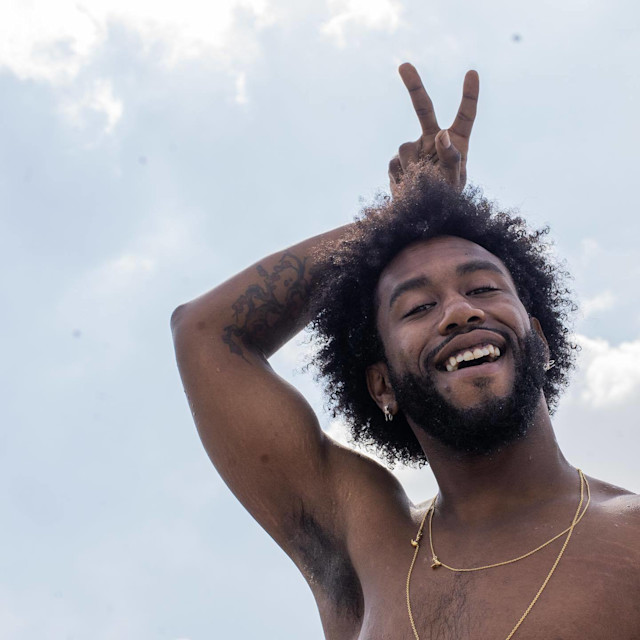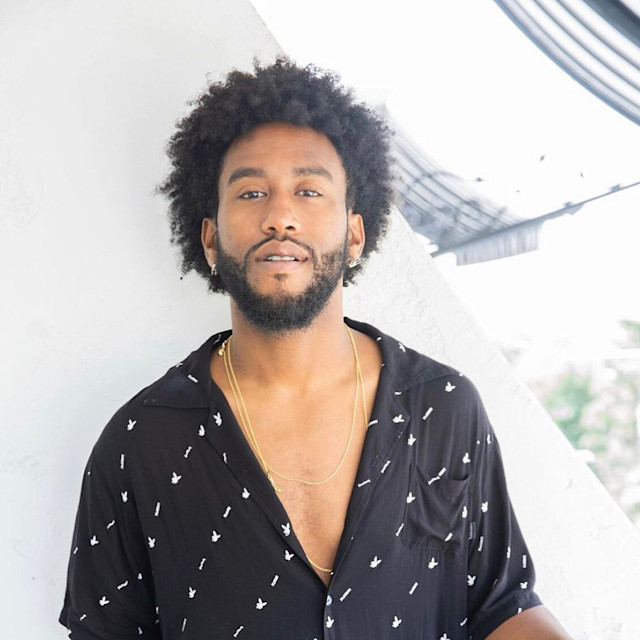Chance The Rapper’s longtime collaborator, Peter CottonTale, gets vulnerable on his chronic pain, hope for the future, and running while Black.
Peter Wilkins, more commonly known as Peter CottonTale, is just happy to be here.
The 32-year-old musician has a Grammy Award for his work with Chance the Rapper. The two hail from neighboring areas, Chatham and Grove Heights, predominantly Black neighborhoods in Chicago that have a median income of less than $50,000. (In comparison, the median income for the entire city is more than $65,000.) It’s a place Jahmal Cole, an activist and runner from the neighborhood, describes as having more liquor stores and money exchanges than gyms and runners on the street.
And yet, CottonTale has never allowed his circumstances to limit his vision of what he could accomplish.
At 17 years old, CottonTale was diagnosed with degenerative disc disease, a chronic pain condition in the spine that varies from mild aches to debilitating pain. For CottonTale, it was the latter. His body began to break down faster than what was considered normal for someone his age. It led to herniated discs and pinched nerves in his L1 through L4 discs, which ultimately caused his left leg to become paralyzed, he says.

“I had to have surgery that shaved down my spine,” says CottonTale. “I had to learn how to walk again. I had a huge battle with my nervous system. There were times I had to call off work or I’d be in a wheelchair with shooting pains down my leg.”
RELATED: Making the Impossible a Reality
For nearly 10 years, this pain persisted. At the time, a doctor told him he would be “lucky to still walk by 33,” he recalls. While not entirely gone, the agony has since subsided; he’s been able to walk without major issues or the assistance of a mobility aid for the last five years.
With his newfound mobility, CottonTale began to run at the start of 2020 — a decision inspired by the murder of Ahmaud Arbery, whose only crime was running while being Black. Though justice has been served for Arbery and some progress has been made, CottonTale knows first-hand that there’s still a long way to go before Black runners feel welcome and safe.
“I went on a jog in the Hamptons [last summer] and I started to worry because I don’t know how friendly this place is to Black people,” CottonTale recalls. “I’m five miles in, thinking, ‘What if I’m running on somebody’s property?’ I started thinking of Ahmaud Arbery. I was like, ‘Jesus Christ, why am I still feeling like this? We should be past this point.’ I don’t think the world creates a safe space for Black runners. I still get scared to run at night.”
Still, CottonTale kept logging miles. Throughout 2023, he followed through on preparing for his dream of running his first marathon — despite having what he calls “no athletic background” and a recently diagnosed nerve and heart condition that left him weak and unsure of what came next, he recalls. After all, this is CottonTale — a man who has defied the odds on more than one occasion before.

Just a few months after his diagnosis, he earned his marathon medal, with a finish time of 04:52:51 on the Chicago course. The moment held a deeper significance than simply meeting a goal he had trained for. It was a celebration of how far he’d come.
RELATED: Inside New York’s Surf Culture
“These last few years of athleticism have opened my eyes so much about this temple we’ve been blessed with,” he captioned a photo posted to his Instagram following his finish. “Fellowship, Faith, & love carried me to the end. I’m hoping this inspires someone like me that comes from areas that I come from, to do something as well.”
Nowadays, CottonTale is doing more lifting than running. However, he’s gearing up for a number of races (including a half marathon in June) and expects to be logging a minimum of eight to 10 hours on his feet per week. Accra, Ghana; Kingston, Jamaica; and Gothenburg, Sweden are among his more exotic running locations.
What keeps him going is the hope that by showing up, he becomes living proof that other Black and Brown joggers can do it, too. He’s the first to admit that examples of and education on health and wellness were limited in his Black, Southern community throughout his upbringing. However, in becoming a runner, he discovered another community, one of folks with similar backgrounds who shared the same mindset and vision for their health. Now, CottonTale wants other people from marginalized backgrounds to feel just as inspired and empowered.
“With this athleticism, I'm trying to do what God is telling me to do with my body and take care of it,” says CottonTale. “After finishing the marathon, friends I ran with were talking about doing marathons in Tokyo, London, or Boston next. Even if we don’t get there, it’s worth it to run and work out with my friends.”
